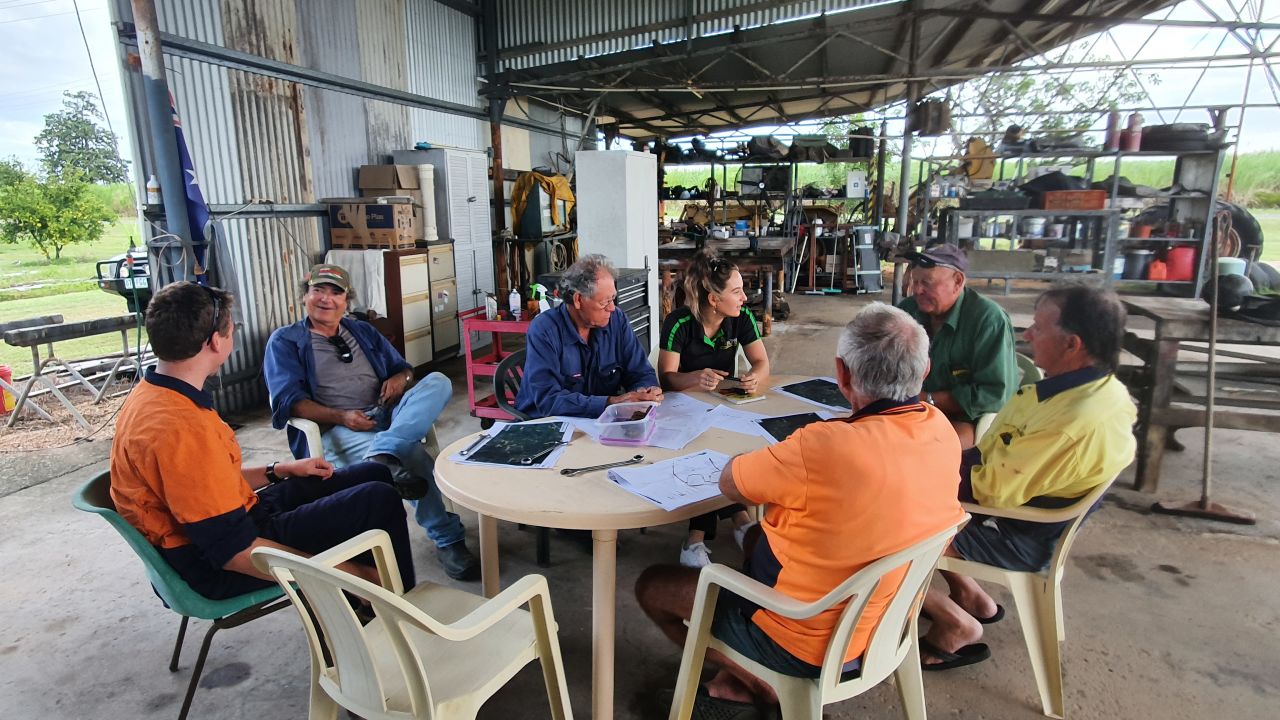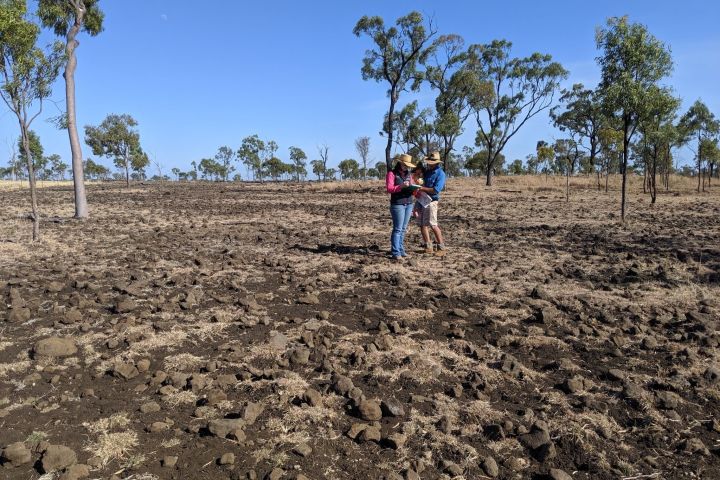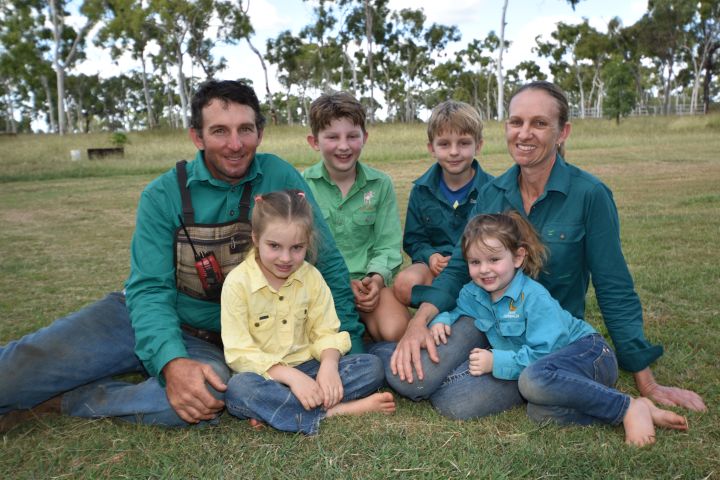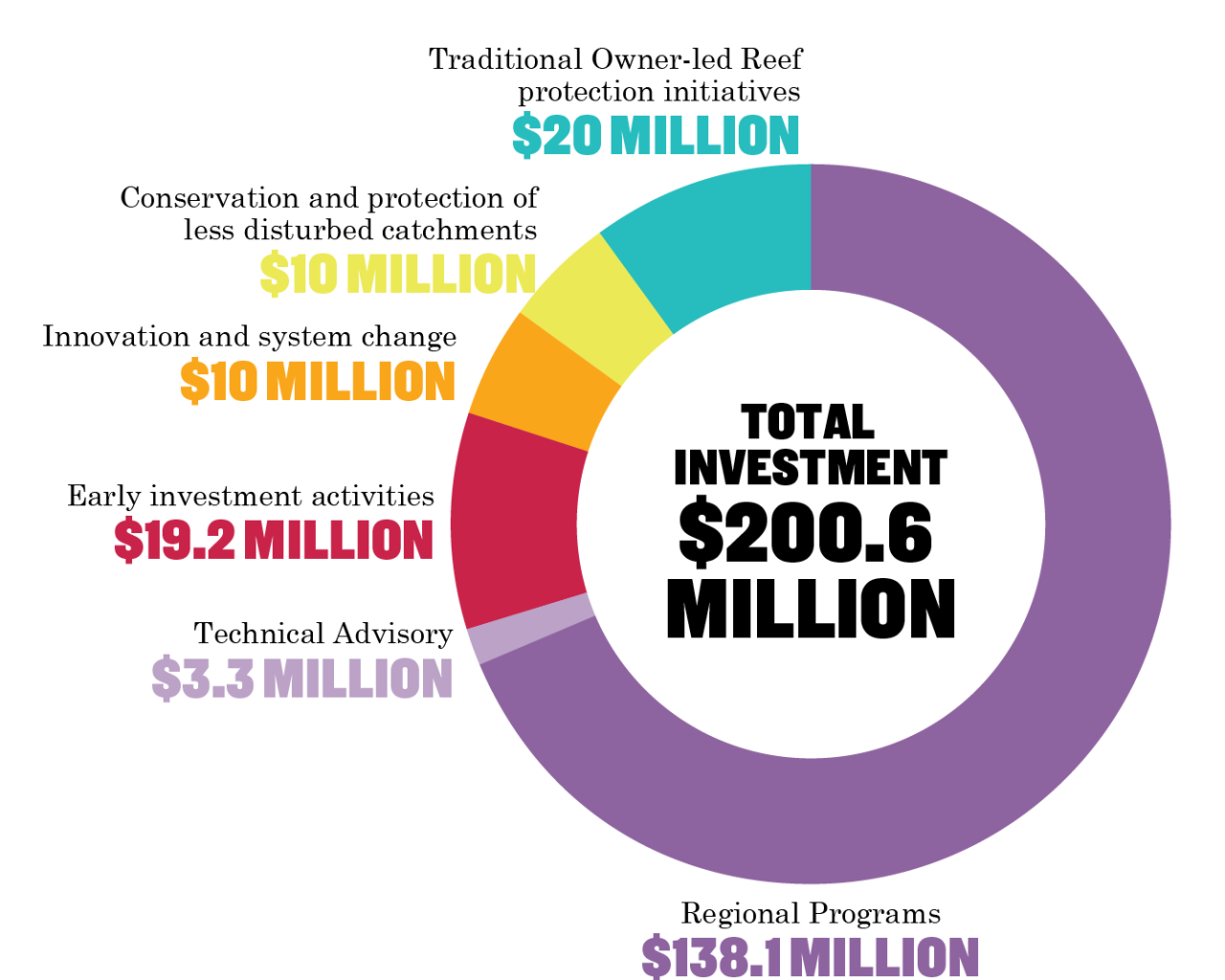Project News ·
First water quality projects wrap up under Reef Trust Partnership
The Great Barrier Reef Foundation has closed the books on a suite of early investment projects aimed at building or maintaining delivery capacity for the $200.6 million Water Quality component of the Reef Trust Partnership. Read more about the impacts achieved by working hand-in-hand with sugar and grazing industry partners to complete 11 projects that benefit landholders and the Reef.

Image above: Grower meeting at Legges Road for the Cane to Creek 2.0 project led by Sugar Research Australia. Here, Hannah Van Houweninge talks to the Legges Road grower group. Cane to Creek 2.0 works on farm with small cane grower groups to address nitrogen and pesticides to break down the barriers between scientists and growers, maximise peer-to-peer learning opportunities and improve understanding of the drivers of water quality impacts.
#Why deliver the $19.2 million Early Investments Program?
Poor water quality from the Reef's adjacent catchments is a major threat to the health of Reef ecosystems. Agricultural extension and agronomy services are fundamental to improved long-term land management that improves the Reef's resilience to all critical threats, including climate change.
The first round of grants released under the $200.6M Water Quality Component of the Reef Trust Partnership focused on projects that would maintain or build on-ground delivery capacity throughout the Reef's catchments. Underway from early 2019 to mid 2021, these 11 investments helped lay the foundation for the Partnership's 10 major regional water quality programs, while also contributing directly towards Reef 2050 water quality objectives through achieving reductions in pollutant loads.
The 11 projects were delivered by collaborating with regional partners long committed to restoring Reef catchments, who use the latest science and technology to provide reliable agricultural extension services for landholders working to improve the resilience of their land and the Reef.
Two projects that accomplished their goals under budget were able to continue providing crucial support to landholders working hard to help achieve water quality targets outlined in the Reef 2050 Water Quality Improvement Plan.
#Impact
These 11 early investment projects have:
- Engaged 316 graziers and 658 cane growers across 24 of the 35 Reef catchments.
- Prevented an average of up to 122 tonnes of nitrogen and 224 kilograms of pesticides from entering the Reef every year by working with cane growers to implement sustainable farming techniques based on the latest science.
- Remediated 41 gully sites and seven kilometres of streambank. The remediated gullies alone led to an average of up to 2,000 tonnes of fine sediment staying on country where it belongs rather than suspended in the ocean’s water column, where it smothers Reef ecosystems.
- Hosted education and awareness events that reached 1901 landholders, paving the way for increased participation in the 10 regional programs currently underway.
- 770 landholders have changed farming practices for the long-term because of the extension support provided.
#Case Study: Reefwise Grazing
When Damien and Fran Lyons (image below) moved to Basalt River Station in the Burdekin River catchment in 2016, they walked onto a blank canvas on which they could paint their own family’s future.
They were original participants in the Reef Trust 1 Saving Our Soils project and continued building their capacity and ability to implement their desired grazing management system by joining the Reefwise Grazing project managed by NQ Dry Tropics.
“When we moved to Basalt River, Fran and I decided we wanted to focus on two critical aspects of our business: to improve landscape resilience and be able to get the best utilisation out of our pastures without compromising our land condition, and to achieve optimum breeder herd performance, especially the reproductive performance of our cattle,” said Mr. Lyons.
The Lyons recognised the importance of maintaining their property’s soils through careful management of its vegetation.
“We’ve been told cash is king,” said Mrs. Lyons. “In our operation though, our ‘cash’ is the grass that we are able to grow, graze and regenerate. It not only produces the beef we sell but having a good strong mix of perennial grasses and legumes means we need to supplement our cattle less, it means we have soils that are building a good ecological capacity for life and the deep storage of moisture.”
The efforts of the Lyons family were rewarded with a significant shift in the ground cover of some of their more vulnerable soils.
“We’ve managed to hold the soil in place with the grasses and their roots, store more moisture for longer in the soil and protect the soil from the heat during summer,” said Mrs. Lyons.
By keeping the soil on their property in place, the Lyons have prevented pollutants from entering water ways and washing out to the Great Barrier Reef Lagoon, where they can snuff out sea grass ecosystems and inshore coral reefs by reducing the amount of sunlight that can penetrate the water column.
“Strong pastures, good quality water, living soils and high-performing animals all matched with the best quality of life,” said Mr. Lyons.
Image below: Black basalt is preferentially grazed by stock in comparison to surrounding land types. Careful management of stock on these areas is required to ensure end of dry season ground cover can be maintained. Fencing and water relocation, plus strategic supplement placement in well-grassed areas can help graziers to manage pressure on black basalt. Here, Sarah Ziebarth (NQ Dry Tropics) is working with Damien Lyons to undertake a Land Condition Assessment in September 2019, to support their incentive project development through Reefwise Grazing.


#Case Study: Cane Changer 2.0
Growing cane in Far North Queensland is such an integral part of Rose and Stephen Destro’s family life it’s practically in their blood. Both grew up helping around their parents' cane farms and raised two sons together who continue the family trade.
Rose and Stephen met in high school and married shortly after graduation.
“I was thrilled we both shared the same love for cane farming,” says Mrs Destro.
“I’ve always loved cane farming and it’s clear our boys have the same passion. I couldn’t be more proud to have raised a third generation of cane farmers.”
The Destro family’s pride in what they do is evident in their eagerness to put in the hard work of adopting the latest technologies and practices.
With the help of the Reef Trust Partnership’s Cane Changer 2.0 early investment project, the family now manages 2000 hectares of cane across six different properties that are considered at the cutting edge of best cane farming practices and accredited by Smartcane BMP, one of sugar cane’s best management practice program. Smartcane BMP involves a grower working with a local facilitator to demonstrate how sustainable practices can also improve farm productivity.
“We’ve seen huge difference to our profitability and there’s less run-off leaving the farm now,” said Mrs. Destro.
Through RTP investment, Cane Changer 2.0 built on the existing Cane Changer program (featured in the video above) in the Wet Tropics and initiated new programs in Mackay, Burdekin and Southern Regions.
#RTP In Focus: Water Quality
Keen to know more about the $200.6M Water Quality Component of the Reef Trust Partnership? Watch this webinar to learn more.





